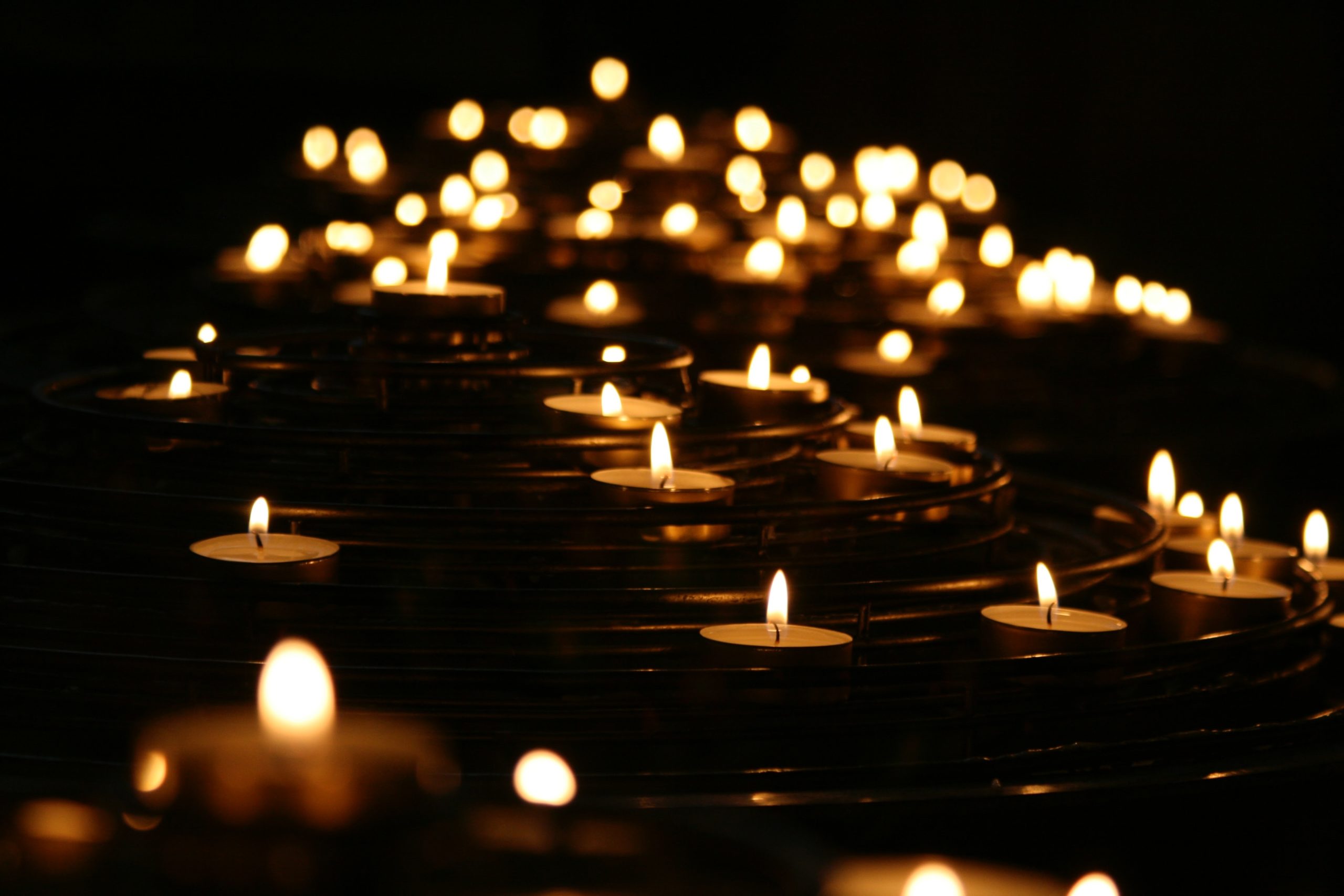Our lives are marked not only by joy but also by grief and loss. We welcome new life into the world; celebrate a birthday, graduation, new job, or engagement. We laugh with friends and family over joyous occasions, as we should. But even as we do this, there are also often causes to mourn.
 The loss of a loved one to an illness, war, or another cause; the loss of a job or a meaningful relationship. These and many other losses bring grief in their wake. We are reminded in the Bible that these realities are all a part of life.
The loss of a loved one to an illness, war, or another cause; the loss of a job or a meaningful relationship. These and many other losses bring grief in their wake. We are reminded in the Bible that these realities are all a part of life.
There is a time for everything, and a season for every activity under heaven: a time to be born and a time to die, a time to plant and a time to uproot, a time to kill and a time to heal, a time to tear down and a time to build, a time to weep and a time to laugh, a time to mourn and a time to dance… – Ecclesiastes 3:1-4
Bible Verses About Grief and Loss
While grief is a process that each person walks through in their own way, through community, and the encouraging words of Scripture, we don’t have to walk through our grief alone.
From the Psalms
The book of Psalms contains a variety of prayers and songs. They range in mood from the ecstatic to the pit of despair. That is because as people we have and experience a range of emotions in different situations. Psalms give us the words and the language to voice our grief, our joy, our confusion, our fear, and more.
Just as God has given us many emotions, he’s given us the ability to express these, and the Psalms can be our guide and give us the words when we don’t have our own. Sometimes, we can feel like certain emotions or expressions of those emotions aren’t permissible. But seeing your thoughts and feelings echoed in the words of Scripture also gives us permission to feel and say those things.
Be merciful to me, Lord, for I am faint; O Lord, heal me, for my bones are in agony. My soul is in anguish. How long, O Lord, how long? – Psalm 6:2-3
Sometimes, we are eager for God to address our pain and anguish, and we ask God when he will do this, how long will we have to wait, and why does it have to hurt for such a long time. These are all real and legitimate questions to ask, as the Psalmist did.
 But you, O God, do see trouble and grief; you consider it to take it in hand. The victim commits himself to you; you are the helper of the fatherless. – Psalm 10:14
But you, O God, do see trouble and grief; you consider it to take it in hand. The victim commits himself to you; you are the helper of the fatherless. – Psalm 10:14
When you go through tough times, it is tempting to feel alone, to think that no one can see you, no one can see the pain that you are in, and if they do see it, they are unwilling to help. It can feel as though there is nowhere to turn, we have no recourse. But this Psalm reminds us of God’s presence and attention to what people are going through.
Though it may seem like people can’t see your grief, God sees. Even in the moments when it seems like God isn’t paying attention, rest assured God sees your trouble and your grief. It is safe to commit yourself into the hands of God because He is our helper.
The Lord is my shepherd, I shall not be in want… Even though I walk through the valley of the shadow of death, I will fear no evil, for you are with me; your rod and your staff, they comfort me. – Psalm 23:1, 4
Life often takes us into territory into which we would never voluntarily go. The dark valleys we may walk in as we confront our mortality and that of others can be terrifying. Nothing reminds us of our sheer powerlessness more than confronting the maw of death and our humanity.
But even at the precipice, however, the Psalmist is encouraged and doesn’t fear whatever evil has or may come. The reason for this is that God walks with us in our darkest moments. If a sheep is walking in a valley dotted with ravenous wolves, the fact that the shepherd is there with them, and that the shepherd will die defending them from harm, ought to be heartening.
We do not walk in those valleys with just anyone, but with God himself. Our darkest moments may seem like when we are most isolated and exposed, but God is with us in that darkness, fighting on our behalf.
From the New Testament
You will grieve, but your grief will turn to joy. – John 16:20
Jesus spoke these words to his disciples on the night he was arrested and a day before the Romans unjustly executed him. He wanted to prepare his followers for what was about to come, giving them comfort in their time of distress. The disciples’ grief turned to joy three days later when Jesus rose from the dead, and he appeared to them.
 Christian hope is anchored on God who can do the impossible, according to his wisdom and timing. It’s not always clear why we go through what we go through, why we lose loved ones and must go through grief. These are questions that no human can answer satisfactorily. But we do know that God is at work even in the darkest circumstances. Even when it seems that death has the final word, God is at work bringing about new expressions of life.
Christian hope is anchored on God who can do the impossible, according to his wisdom and timing. It’s not always clear why we go through what we go through, why we lose loved ones and must go through grief. These are questions that no human can answer satisfactorily. But we do know that God is at work even in the darkest circumstances. Even when it seems that death has the final word, God is at work bringing about new expressions of life.
Praise be to the God and Father of our Lord Jesus Christ, the Father of compassion and the God of all comfort, who comforts us in all our troubles so that we can comfort those in any trouble with the comfort we ourselves have received from God. – 2 Corinthians 1: 3,4
God is our comforter in our grief. And even as God meets us in our grief to comfort us, he has placed a community of people around us to also comfort us with the comfort they received from God in their time of distress. When the time is right, we too will comfort others with the comfort God extended to us during our time of grief. This reminds us of the importance of community in our grief, to open ourselves for others to gift to us what they received.
…we do not want you to be ignorant about those who fall asleep or to grieve like those who have no hope. – 1 Thessalonians 4:13
In this (the coming salvation and an imperishable inheritance) you greatly rejoice, though now for a little while you may have had to suffer grief in all kinds of trials. – 1 Peter 1:6
Being a Christian or a follower of God does not mean that you will be shielded from hardship and grief. The constant reminder for God’s people is that we endure griefs of many kinds now, but that’s not the end of the story. Because of Jesus’ resurrection, Christians know that they will also be raised from death at the end of all things.
This is why sometimes death is spoken of as “falling asleep” in the New Testament. That is not to make death seem pleasant, but it to suggest that because of what Jesus did, death no longer has the final say; it has lost its sting, and so for the Christian, there is no reason to fear it.
 God’s people will lie down in death, but they will be raised to new life (1 Corinthians 15). And because of the fullness of life, God’s people will receive in the new world, this period of suffering they endure is temporary. It seems long to us, but compared to eternity, 10, 20, or 50 years is “a little while.” This doesn’t trivialize what we go through (we’ll see below that God takes it seriously), but it gives us perspective.
God’s people will lie down in death, but they will be raised to new life (1 Corinthians 15). And because of the fullness of life, God’s people will receive in the new world, this period of suffering they endure is temporary. It seems long to us, but compared to eternity, 10, 20, or 50 years is “a little while.” This doesn’t trivialize what we go through (we’ll see below that God takes it seriously), but it gives us perspective.
…he will swallow up death forever. The sovereign Lord will wipe away the tears from all faces. – Isaiah 25:8
…I heard a loud voice from the throne saying, ‘Now the dwelling of God is with people, and he will live with them. They will be his people, and God himself will be with them and be their God. He will wipe away every tear from their eyes. There will be no more death or mourning or crying or pain, for the old order of things has passed away. – Revelation 21:3,4
A time is coming when death will be a thing of the past. The world we live in now, with its hurt, pain, and much to mourn over, will not be the reality forever. A time will come when a new world will be born, and in it, death will be no more. Relationships won’t break down.
God will wipe every tear from all faces. These verses were written to encourage people going through extraordinary hardship. Knowing that joy will come in the morning gave them, and it can certainly give us, the strength to face the darkness.
Conclusion
Our journey of grief and loss is unique, but it doesn’t have to be experienced alone or without hope that this present darkness, this moment of unutterable loss, this too God cares about, and He will not leave us alone. Knowing that our grief will turn to joy – maybe not today, maybe not tomorrow; but it will, in God’s timing – helps us to press on and face a new day with a little more strength, and with that much more hope.
“Candles on the Water”, Courtesy of Mike Labrum, Unsplash.com, CC0 License; “Psalms”, Courtesy of Alabaster Co, Unsplash.com, CC0 License; “Cross”, Courtesy of Jametlene Reskp, Unsplash.com, CC0 License; “Sunbeams Through the Trees”, Courtesy of Wonderlane, Unsplash.com, CC0 License
-
Kate Motaung: Curator
Kate Motaung is the Senior Writer, Editor, and Content Manager for a multi-state company. She is the author of several books including Letters to Grief, 101 Prayers for Comfort in Difficult Times, and A Place to Land: A Story of Longing and Belonging...





